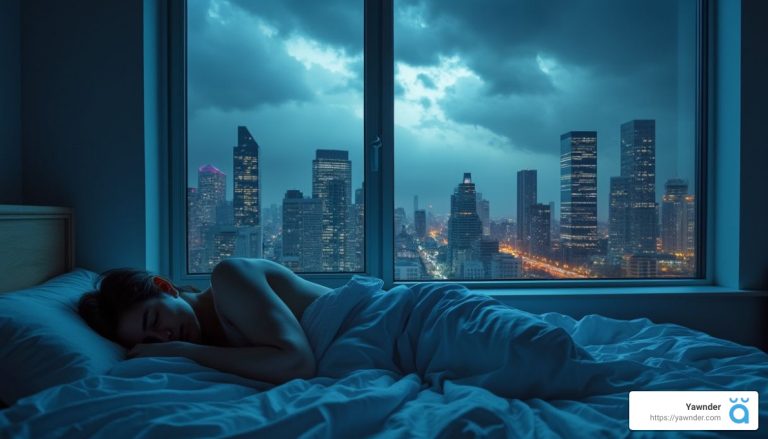An Essential Guide to How Climate Change Affects Your Sleep
Climate change transcends its status as an environmental concern; it increasingly encroaches on the sanctity of our sleep. With rising temperatures and escalating air pollution, our ability to achieve restorative rest is becoming alarmingly compromised. The startling impacts of climate change on our sleep patterns reflect broader concerns for our health and well-being. This article will explore the myriad ways climate change disrupts your sleep and offer practical strategies to enhance your nighttime rest.
Understanding the Impacts of Rising Temperatures
Rising global temperatures are crucial in determining our sleep quality. Studies indicate that for every 1°C increase in nighttime temperatures, approximately three more nights of poor sleep occur per 100 individuals in just a month. This issue becomes particularly severe during the summer months and in urban areas, where the urban heat island effect traps heat and prevents nighttime cooling.
Elevated temperatures interrupt the body’s natural cooling process, which is vital for achieving deep, uninterrupted sleep necessary for recovery. Warm nights inevitably lead to restless tossing and turning, disrupting your sleep cycle and diminishing overall sleep quality.
The Fragmentation of Sleep and Environmental Stressors
As night temperatures rise, the fragmentation of sleep escalates. The body’s struggle to regulate its core temperature becomes a significant barrier to restful sleep. When heat lingers, sleep can morph into a series of broken, shallow cycles, leading to insufficient deep sleep.
Extreme weather events—hurricanes, floods, wildfires—intensified by climate change, add another layer of stress that inhibits rest. Those directly affected by these events often report heightened sleep complaints, especially individuals with pre-existing mental health conditions. The trauma associated with such disasters commonly leads to insomnia, anxiety, and distressing nightmares.
Sleep Duration: A Diminishing Resource
Climate change also reduces sleep duration. The combination of rising temperatures and deteriorating air quality from pollutants can significantly curtail nighttime rest. Particularly, elevated levels of fine particulate matter can trigger respiratory issues that disrupt deep sleep, resulting in a drastic decrease in overall hours spent resting.
Predictive estimates suggest that by the end of this century, individuals may lose about 13 to 15 days of sleep each year simply due to rising temperatures. This loss serves as a reminder that climate change impacts our everyday lives—affecting us not just through catastrophic events but also through the gradual erosion of our sleep.
The Science of Sleep: Temperature’s Role in Rest
Understanding how climate change affects your sleep involves examining three fundamental concepts: circadian rhythm, thermoregulation, and core body temperature.
1. Circadian Rhythm: Our internal 24-hour clock is influenced by external factors like light and temperature. As night approaches, cooler temperatures signal it’s time to wind down. Exposure to natural daylight helps maintain this clock, ensuring better sleep at night.
2. Thermoregulation: This natural mechanism allows our bodies to maintain a stable temperature. While body temperature rises during the day, it cools down at night, promoting restful sleep. An excessively warm environment can interfere with this cooling process, making it difficult to fall asleep.
3. Core Body Temperature: A natural decline in core body temperature before bed signals it’s time to rest. If nighttime conditions remain uncomfortably warm, the body struggles to cool down, significantly disrupting sleep cycles.
Understanding these scientific factors highlights the crucial influence of temperature on sleep quality.
Environmental Factors Adding to Sleep Challenges
Sleep comfort goes beyond bed quality and darkness; external elements such as air pollution, noise, and light pollution also play pivotal roles.
– Air Pollution: Poor air quality can lead to respiratory issues that cause snoring and sleep apnea. Residents in heavily polluted regions often experience reduced sleep quality and less time spent resting.
– Noise Pollution: Urban environments are rife with disruptive sounds, from traffic to construction. Even during sleep, the body remains sensitive to sudden noises, which can lead to lighter sleep and increased awakenings.
– Light Pollution: Artificial light can disrupt our body’s biological signals, forcing our natural rhythms out of sync. The prevalence of urban lighting diminishes natural darkness, complicating the body’s ability to signal when it’s time to sleep.
Health Implications of Poor Sleep Amid Climate Change
The consequences of sleep deprivation are extensive and alarming. Insufficient sleep can lead to a host of health issues, including:
– Cardiovascular Risks: Chronic poor sleep strains the heart. Consistent lack of restful sleep increases the likelihood of hypertension and the risk of heart disease or stroke.
– Mental Health: Impaired sleep elevates anxiety and heightens susceptibility to depression. Research following extreme weather events shows a marked rise in sleep complaints, particularly among those facing mental health challenges.
– Immune System: Sleep acts as a recovery period for the immune system. Poor quality sleep can undermine its ability to ward off illnesses.
Effective Strategies to Enhance Sleep Quality
Despite the daunting landscape of climate change, several strategies can help restore better sleep:
– Cooling Techniques: Methods such as fans or air conditioning can help maintain comfortable sleeping temperatures. Cooling bedding made from breathable fabrics, cold showers before bed, or utilizing ice packs can greatly improve nighttime comfort.
– Optimize the Sleep Environment: Invest in blackout curtains for total darkness, use earplugs or white noise machines to mitigate disturbances, and consider air purifiers to enhance bedroom air quality.
– Utilize Supportive Resources: Products and resources aimed at enhancing sleep quality can provide significant benefits. From innovative cooling solutions to expert guidance, leveraging available tools can help mitigate sleep challenges posed by climate change.
Conclusion
The connection between climate change and sleep health requires urgent attention. As temperatures rise and environmental conditions degrade, taking proactive steps to safeguard our sleep becomes essential. Implementing effective cooling strategies, optimizing sleep environments, and utilizing innovative products will help ensure quality rest in a transforming world.
By making sleep health a priority, not only can we enhance our daily well-being, but we can also fortify ourselves against the broader implications of climate change. Together, we can navigate this evolving landscape and secure the restful nights we desperately need.


















